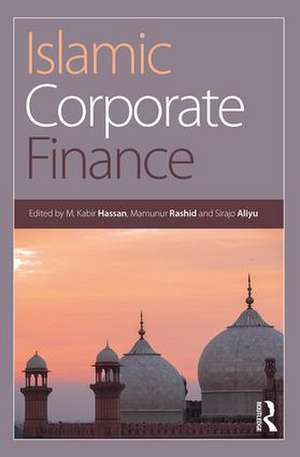Islamic Corporate Finance
Editat de M. Kabir Hassan, Mamunur Rashid, Sirajo Aliyuen Limba Engleză Paperback – 14 iun 2019
The chapters in this edited text offer a full range of topics on corporate finance for Islamic firms, including global comparisons of shariah screening, dividend policy and capital structure of Islamic firms, details of global Islamic equity markets, trends and performance of sukuk markets, and a brief account of derivative securities that can be used in Islamic finance. This is a useful reference for anyone who wishes to learn more about the performance of shariah-compliant companies vis-à-vis conventional firms. The book includes both technical and non-technical information that would be suitable for classroom teaching as well as a reference for postgraduate research students.
| Toate formatele și edițiile | Preț | Express |
|---|---|---|
| Paperback (1) | 243.92 lei 6-8 săpt. | |
| Taylor & Francis – 14 iun 2019 | 243.92 lei 6-8 săpt. | |
| Hardback (1) | 936.08 lei 3-5 săpt. | +24.70 lei 4-10 zile |
| Taylor & Francis – 18 iun 2019 | 936.08 lei 3-5 săpt. | +24.70 lei 4-10 zile |
Preț: 243.92 lei
Preț vechi: 294.54 lei
-17% Nou
Puncte Express: 366
Preț estimativ în valută:
46.69€ • 50.73$ • 39.24£
46.69€ • 50.73$ • 39.24£
Carte tipărită la comandă
Livrare economică 21 aprilie-05 mai
Preluare comenzi: 021 569.72.76
Specificații
ISBN-13: 9781138480926
ISBN-10: 1138480924
Pagini: 224
Ilustrații: 90
Dimensiuni: 156 x 234 x 22 mm
Greutate: 0.28 kg
Ediția:1
Editura: Taylor & Francis
Colecția Routledge
Locul publicării:Oxford, United Kingdom
ISBN-10: 1138480924
Pagini: 224
Ilustrații: 90
Dimensiuni: 156 x 234 x 22 mm
Greutate: 0.28 kg
Ediția:1
Editura: Taylor & Francis
Colecția Routledge
Locul publicării:Oxford, United Kingdom
Public țintă
Postgraduate and UndergraduateCuprins
1. Screening and performance of shariah-compliant companies. 2. Is there a cost for adopting faith-based investment styles? 3. Islamic corporate finance: Capital structure. 4. Islamic venture capital financing. 5. IPO underpricing, regulation, sentiment and shariah screening in Bangladesh. 6. Sukuk: Introduction and global performance. 7. Sukuk: Meaning, valuation, benefits and challenges. 8. Dividend policy: The case of shariah-compliant firms. 9. Prospects for Islamic derivatives in Bangladesh. 10. Impact of derivative usage on the value of shariah-compliant firms in Malaysia. Index
Notă biografică
M. Kabir Hassan is Hibernia Professor of Economics and Finance, and Bank One Professor of Business, at the University of New Orleans, Louisiana, USA.
Mamunur Rashid is Senior Assistant Professor of Finance at the Universiti Brunei Darussalam.
Sirajo Aliyu is Senior Lecturer at the Federal Polytechnic Bauchi-Nigeria, and a certified member of the International Council of Islamic Finance Educators and Chartered Institute of Islamic Finance Professionals.
Mamunur Rashid is Senior Assistant Professor of Finance at the Universiti Brunei Darussalam.
Sirajo Aliyu is Senior Lecturer at the Federal Polytechnic Bauchi-Nigeria, and a certified member of the International Council of Islamic Finance Educators and Chartered Institute of Islamic Finance Professionals.
Recenzii
Because they comply with shariah law, Islamic firms – financial as well as non-financial – behave differently from their conventional counterparts. While we know a lot about the structure and operation of Islamic financial institutions, information on Islamic non-financial corporations is very limited. This book combines technical as well as non-technical information on Islamic listed corporations and their structures and strategies, from several dimensions. The contents of this book will be particularly useful for academics to get an in-depth view of Islamic corporate finance, with evidence garnered from around the globe.
—Professor Dr. Habib Ahmed, Durham University, UK
In recent years the Islamic financial services industry has seen astonishing, double-digit global growth, mostly in the form of financial firms (Islamic banks, microcredits, and others). However, the existing literature provides minimal coverage of the underlying corporate finance assumptions and relevant financing strategies non-financial shariah-compliant corporations which engage in halal business – that permitted by shariah law. This book covers regular topics in corporate finance, such as performance matrix/measures, capital structure, dividend policy, and pertinent corporate finance issues, from the perspective of Islamic corporations. The book will help both corporate leaders and academics to arrive at a deeper understanding of Islamic corporate financing, especially in emerging economies.
—Dr. Syed Musa Bin Syed Jaafar Alhabshi, Dean, International Islamic University Malaysia (IIUM) Institute of Islamic Banking and Finance, Malaysia
—Professor Dr. Habib Ahmed, Durham University, UK
In recent years the Islamic financial services industry has seen astonishing, double-digit global growth, mostly in the form of financial firms (Islamic banks, microcredits, and others). However, the existing literature provides minimal coverage of the underlying corporate finance assumptions and relevant financing strategies non-financial shariah-compliant corporations which engage in halal business – that permitted by shariah law. This book covers regular topics in corporate finance, such as performance matrix/measures, capital structure, dividend policy, and pertinent corporate finance issues, from the perspective of Islamic corporations. The book will help both corporate leaders and academics to arrive at a deeper understanding of Islamic corporate financing, especially in emerging economies.
—Dr. Syed Musa Bin Syed Jaafar Alhabshi, Dean, International Islamic University Malaysia (IIUM) Institute of Islamic Banking and Finance, Malaysia
Descriere
This book provides a global comparison of Shari’ah screening, dividend policy and capital structure of Islamic firms, details on global Islamic equity markets, trends and performance of Islamic debt (Sukuk) market, and a brief on hybrid securities that can be used in Islamic finance.
